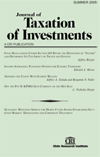Non-Income Taxes and Foreign Direct Investment
Author: Werner Lotz.
Source: Volume 28, Number 04, Summer 2011 , pp.35-65(31)

< previous article |next article > |return to table of contents
Abstract:
Tax policy “tweaking” is a common method countries use to support their financial and other policy goals. Equally common, investors seek to invest where they are likely to optimize net aftertax profits. The author examines the significance of non-income taxes (NIT) and non-income-related components (NIC) included in the tax base of income-related taxes (IRT) in both location and investment decisionmaking by foreign investors. His analysis takes into account cross-border investors’ specific objectives and the effects of NIT and NIC on their effective tax burdens, including the effects of a host country’s structural tax reform, which would shift part of the revenue base from growth-inhibiting direct IRT to growth-inducing indirect NIT. The results are contrasted with the NIT-related welfare considerations of host countries attempting to design an “optimal tax system” that will proactively encourage additional growth-inducing foreign direct investment (FDI), but simultaneously ensure that widely recognized tax benchmarks are adopted and that sufficient tax revenue is generated to facilitate essential fiscal tasks. The author suggests that a trade-off between the two sets of objectives can be attained by means of appropriate changes to the NIT/NIC policies of the host country.Keywords: non-income tax, net after-tax profit, foreign investment, tax incidence, effective tax burden, tax policy, tax reform
Affiliations:
1: DDB Services GmbH.